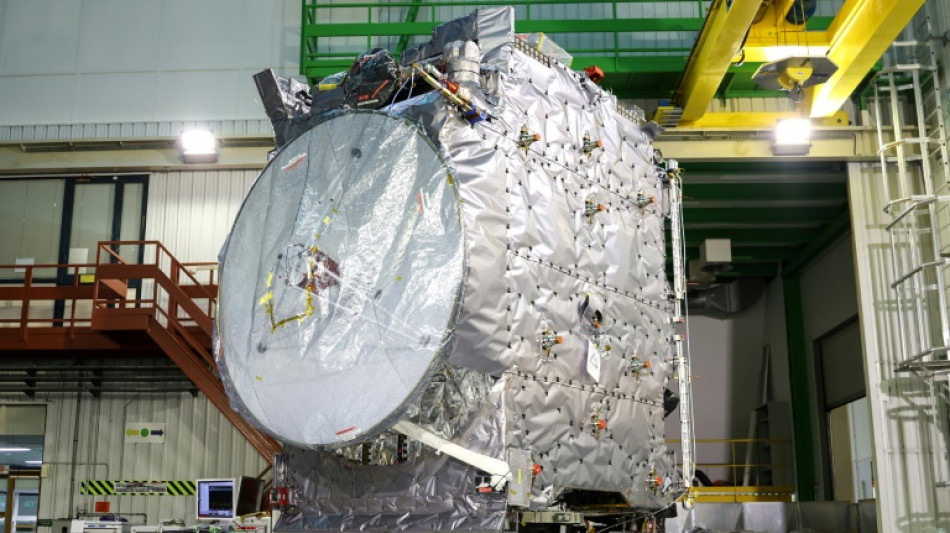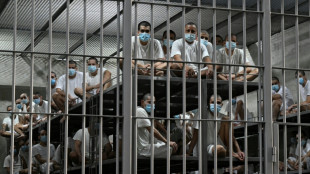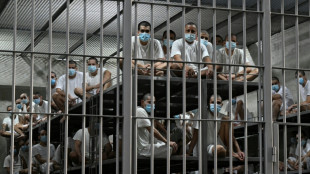
-
 Swiss court to hear landmark climate case against cement giant
Swiss court to hear landmark climate case against cement giant
-
Knicks' Brunson scores 47, Bulls edge Hawks epic

-
 Global nuclear arms control under pressure in 2026
Global nuclear arms control under pressure in 2026
-
Asian markets rally with Wall St as rate hopes rise, AI fears ease

-
 Jailed Malaysian ex-PM Najib loses bid for house arrest
Jailed Malaysian ex-PM Najib loses bid for house arrest
-
Banned film exposes Hong Kong's censorship trend, director says

-
 Duffy, Patel force West Indies collapse as NZ close in on Test series win
Duffy, Patel force West Indies collapse as NZ close in on Test series win
-
Australian state pushes tough gun laws, 'terror symbols' ban after shooting

-
 A night out on the town during Nigeria's 'Detty December'
A night out on the town during Nigeria's 'Detty December'
-
US in 'pursuit' of third oil tanker in Caribbean: official

-
 CO2 soon to be buried under North Sea oil platform
CO2 soon to be buried under North Sea oil platform
-
Steelers edge Lions as Bears, 49ers reach playoffs

-
 India's Bollywood counts costs as star fees squeeze profits
India's Bollywood counts costs as star fees squeeze profits
-
McCullum admits errors in Ashes preparations as England look to salvage pride

-
 Pets, pedis and peppermints: When the diva is a donkey
Pets, pedis and peppermints: When the diva is a donkey
-
'A den of bandits': Rwanda closes thousands of evangelical churches

-
 Southeast Asia bloc meets to press Thailand, Cambodia on truce
Southeast Asia bloc meets to press Thailand, Cambodia on truce
-
As US battles China on AI, some companies choose Chinese

-
 AI resurrections of dead celebrities amuse and rankle
AI resurrections of dead celebrities amuse and rankle
-
Steelers receiver Metcalf strikes Lions fan

-
 Morocco coach 'taking no risks' with Hakimi fitness
Morocco coach 'taking no risks' with Hakimi fitness
-
Gang members given hundreds-years-long sentences in El Salvador

-
 Chargers, Bills edge closer to playoff berths
Chargers, Bills edge closer to playoff berths
-
Gang members given hundred-years-long sentences in El Salvador

-
 Hosts Morocco off to winning start at Africa Cup of Nations
Hosts Morocco off to winning start at Africa Cup of Nations
-
No jacket required for Emery as Villa dream of title glory

-
 Amorim fears United captain Fernandes will be out 'a while'
Amorim fears United captain Fernandes will be out 'a while'
-
Nigerian government frees 130 kidnapped Catholic schoolchildren

-
 Captain Kane helps undermanned Bayern go nine clear in Bundesliga
Captain Kane helps undermanned Bayern go nine clear in Bundesliga
-
Captain Kane helps undermanned Bayern go nine clear

-
 Rogers stars as Villa beat Man Utd to boost title bid
Rogers stars as Villa beat Man Utd to boost title bid
-
Barca strengthen Liga lead at Villarreal, Atletico go third

-
 Third 'Avatar' film soars to top in N. American box office debut
Third 'Avatar' film soars to top in N. American box office debut
-
Third day of Ukraine settlement talks to begin in Miami

-
 Barcelona's Raphinha, Yamal strike in Villarreal win
Barcelona's Raphinha, Yamal strike in Villarreal win
-
Macron, on UAE visit, announces new French aircraft carrier

-
 Barca's Raphinha, Yamal strike in Villarreal win
Barca's Raphinha, Yamal strike in Villarreal win
-
Gunmen kill 9, wound 10 in South Africa bar attack

-
 Allegations of new cover-up over Epstein files
Allegations of new cover-up over Epstein files
-
Atletico go third with comfortable win at Girona

-
 Schwarz breaks World Cup duck with Alta Badia giant slalom victory
Schwarz breaks World Cup duck with Alta Badia giant slalom victory
-
Salah unaffected by Liverpool turmoil ahead of AFCON opener - Egypt coach

-
 Goggia eases her pain with World Cup super-G win as Vonn takes third
Goggia eases her pain with World Cup super-G win as Vonn takes third
-
Goggia wins World Cup super-G as Vonn takes third

-
 Cambodia says Thai border clashes displace over half a million
Cambodia says Thai border clashes displace over half a million
-
Kremlin denies three-way US-Ukraine-Russia talks in preparation

-
 Williamson says 'series by series' call on New Zealand Test future
Williamson says 'series by series' call on New Zealand Test future
-
Taiwan police rule out 'terrorism' in metro stabbing

-
 Australia falls silent, lights candles for Bondi Beach shooting victims
Australia falls silent, lights candles for Bondi Beach shooting victims
-
DR Congo's amputees bear scars of years of conflict


Europe's JUICE mission to launch for Jupiter's icy moons
The European Space Agency's JUICE spacecraft is to blast off Thursday on an eight-year journey through the Solar System to discover whether Jupiter's icy moons are capable of hosting extraterrestrial life in their vast, hidden oceans.
The JUpiter ICy Moons Explorer (JUICE) has received the green light for its scheduled launch on an Ariane 5 rocket from Europe's spaceport in Kourou, French Guiana at 1215 GMT.
"The weather conditions are good," Guiana Space Centre director Marie-Anne Clair said on Wednesday in the control room, where Belgium's King Philippe was among those in attendance.
The six-tonne spacecraft, which is roughly four square metres, will separate from the rocket at an altitude of 1,500 kilometres (930 miles) a little under half an hour after blast-off.
Then begins JUICE's long and winding path towards Jupiter, which is 628 million kilometres from Earth.
Because the spacecraft lacks the power to fly straight towards Jupiter, it will have to slingshot around other planets to get a gravitational boost.
First, it will do a fly-by of Earth and the Moon, then slingshot around Venus in 2025 before swinging past Earth again in 2029.
Then it will finally take off on its challenging journey towards the Solar System's largest planet.
- 'Are we alone in the universe?' -
The spacecraft is wrapped in 500 layered thermal insulation blankets to protect itself against temperatures expected to soar above 250 degrees Celsius (480 degrees Fahrenheit) as it flies past Venus, then plummet below minus 230C near Jupiter.
It has a record 85 square metres of solar panels, which stretch out to the size of a basketball court, to collect as much energy as possible near Jupiter, where sunlight is 25 times weaker than on Earth.
Once the probe arrives at Jupiter in 2031 -- now with two billion kilometres on the odometer -- it will need to very carefully hit the brakes to enter the orbit of the gas giant.
From there, JUICE will focus on Jupiter's system, including the gas giant and its three icy moons Europa, Ganymede and Callisto.
Its 10 scientific instruments -- including an optical camera, ice-penetrating radar, spectrometer and magnetometer -- will inspect and analyse the moons' weather, magnetic field, gravitational pull and other elements.
Carole Mundell, the ESA's science director, said the Jovian system had all the ingredients of a mini-solar system.
Studying the system will allow scientists to investigate how our Solar System formed -- and ultimately attempt to answer the age-old question "are we alone in the universe?" she said.
The mission will not be able to directly detect the existence of alien life, but instead aims to establish whether the moons have the right conditions to harbour life.
- Liquid water -
First discovered by astronomer Galileo Galilei more than 400 years ago, Jupiter's icy moons were long ignored as potential candidates for hosting life.
But previous space probes have suggested that deep below their icy shells, there are huge oceans of liquid water -- the main ingredient for life as we know it.
That has made Ganymede and Europa prime candidates in the search for life in our celestial backyard.
Europa will be investigated by NASA's Europa Clipper mission, which is scheduled to launch in October 2024.
JUICE, meanwhile, has set its sights on Ganymede, the Solar System's largest moon and the only one that has its own magnetic field, which protects it from radiation.
In 2034, JUICE will slide into Ganymede's orbit, the first time a spacecraft has done so around a moon other than our own.
ESA director-general Josef Aschbacher said the 1.6 billion-euro ($1.7 billion) JUICE is one of the "most complex" spacecraft ever sent into the outer Solar System beyond Mars.
The launch comes as Europe is struggling to find ways to blast its missions into space following Russia's withdrawal of its Soyuz rockets in response to sanctions over the war in Ukraine -- as well as repeated delays to the Ariane 6 launcher and the failure of Vega-C's first commercial flight.
Thursday will mark the penultimate launch for Ariane 5 before it is replaced by the next-generation Ariane 6.
P.Martin--AMWN



